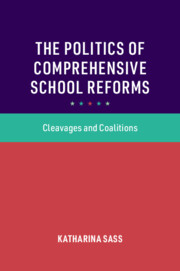Acknowledgments
Many people have contributed to this book in some way. First, I would like to thank my interview partners, who were all experts in the field of education politics and who lived through the late 1950s to 1970s as active participants in the political processes. It was an honor and a very enjoyable experience to speak to them and to listen to their fascinating accounts of this eventful time. It is very much due to the interviews that I became aware of the high importance of crosscutting cleavages in education politics. Short biographical introductions of the interviewed experts are included in the Annex of this book. I am very grateful to them all.
I also thank my current and former colleagues at the Department of Sociology of the University of Bergen and at our neighboring departments, the Department of Comparative Politics and the Department of Administration and Organization Theory, who have commented on this project at its various stages. A special thanks goes to Ole Johnny Olsen, Rune Sakslind, Ann Nilsen, Olav Korsnes, Hans-Tore Hansen, Georg Picot, Stein Kuhnle, the other participants of the Comparative Political Economy lunch seminars and the members of my PhD group (those were the days!).
Many international colleagues have given me valuable advice. I am especially grateful to Terry M. Moe, Rita Nikolai, Harald Jarning, Susanne Wiborg, Paul Oehlke, Benjamin Edelstein and to the anonymous reviewers, for highly useful comments on different drafts or parts of this work. I am also grateful to the colleagues I met at conferences, workshops, and during my research stays, especially to those who contributed to the organization of streams and workshops on the politics of education. My research stays at the Max Planck Institute for the Study of Societies in Cologne in 2015 and at the Department of Politics and Public Administration of the University of Konstanz in 2017 have given me opportunities to collect material and exchange ideas with German researchers. I thank especially Wolfgang Streeck and Marius Busemeyer for making these research stays possible and for their good advice on many issues.
I am also grateful to the staff of the many libraries and archives I have been in touch with, who have been extremely generous in their support, especially our local library of the University of Bergen and the staff of the Infothek of the Landtag NRW. Furthermore, I thank all those professionals working with Cambridge University Press who have helped to make this book publishable; the editors, the copy editor, the typesetter and so on, as well as the independent indexer. And I thank my friend Kristina Onstad Sangolt for taking me to school with her one day and giving me a firsthand experience of what her job as a Norwegian primary schoolteacher is like.
Not least, I am grateful to my family and friends in Germany and Norway, especially my husband Remy, without whom I could not have completed this book. A special thanks goes to my parents, Ulla and Fiete, who have taught me the most important sociological skill: to always ask questions. Their enthusiasm for education has clearly been passed on to me.
Finally, I thank all future readers. I hope this book will be of use to you in some way. Maybe reading about education politics in the past can even inspire you to dream about a future in which all people can develop their creative capacities and live and learn together in solidarity and peace.

